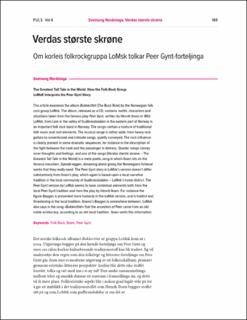Verdas største skrøne: Om korleis folkrockgruppa LOMsk tolkar Peer Gynt-forteljinga
Peer reviewed, Journal article
Published version
Permanent lenke
https://hdl.handle.net/11250/3105929Utgivelsesdato
2021Metadata
Vis full innførselSamlinger
Originalversjon
Nordstoga, S. (2021). Verdas største skrøne: Om korleis folkrockgruppa LoMsk tolkar Peer Gynt-forteljinga. Puls - journal for ethnomusicology and ethnochoreology. 6, 169-185.Sammendrag
This article examines the album Bukkerittet (The Buck Ride) by the Norwegian folk rock group LoMsk. The album, released as a CD, contains motifs, characters and situations taken from the famous play Peer Gynt, written by Henrik Ibsen in 1867. LoMsk, from Lom in the valley of Gudbrandsdalen in the eastern part of Norway is an important folk rock band in Norway. The songs contain a mixture of traditional folk music and rock elements. The musical range is rather wide, from heavy rock guitars to romanticized and intimate songs, quietly conveyed. The rock influence is clearly present in some dramatic sequences, for instance in the description of the fight between the cook and the passenger in distress. Quieter songs convey inner thoughts and feelings, and one of the songs (Verdas største skrøne – The Greatest Tall Tale in the World) is a meta poetic song in which Ibsen sits on the famous mountain, Gjende-eggen, dreaming about giving the Norwegians fictional works that they really need. The Peer Gynt story in LoMsk’s version doesn’t differ substantively from Ibsen’s play, which again is based upon a local narrative tradition in the local community of Gudbrandsdalen – LoMsk’s home district. The Peer Gynt version by LoMsk seems to have contextual elements both from the local Peer Gynt tradition and from the play by Henrik Ibsen. For instance the figure Bøygen is presented more humanly in the LoMsk version, and is hateful and threatening in the local tradition. Ibsens’s Bøygen is somewhere between. LoMsk also says in the song «Bukkerittet» that the ancestors of Peer came from an old noble aristocracy, according to an old local tradition. Ibsen omits this information.
